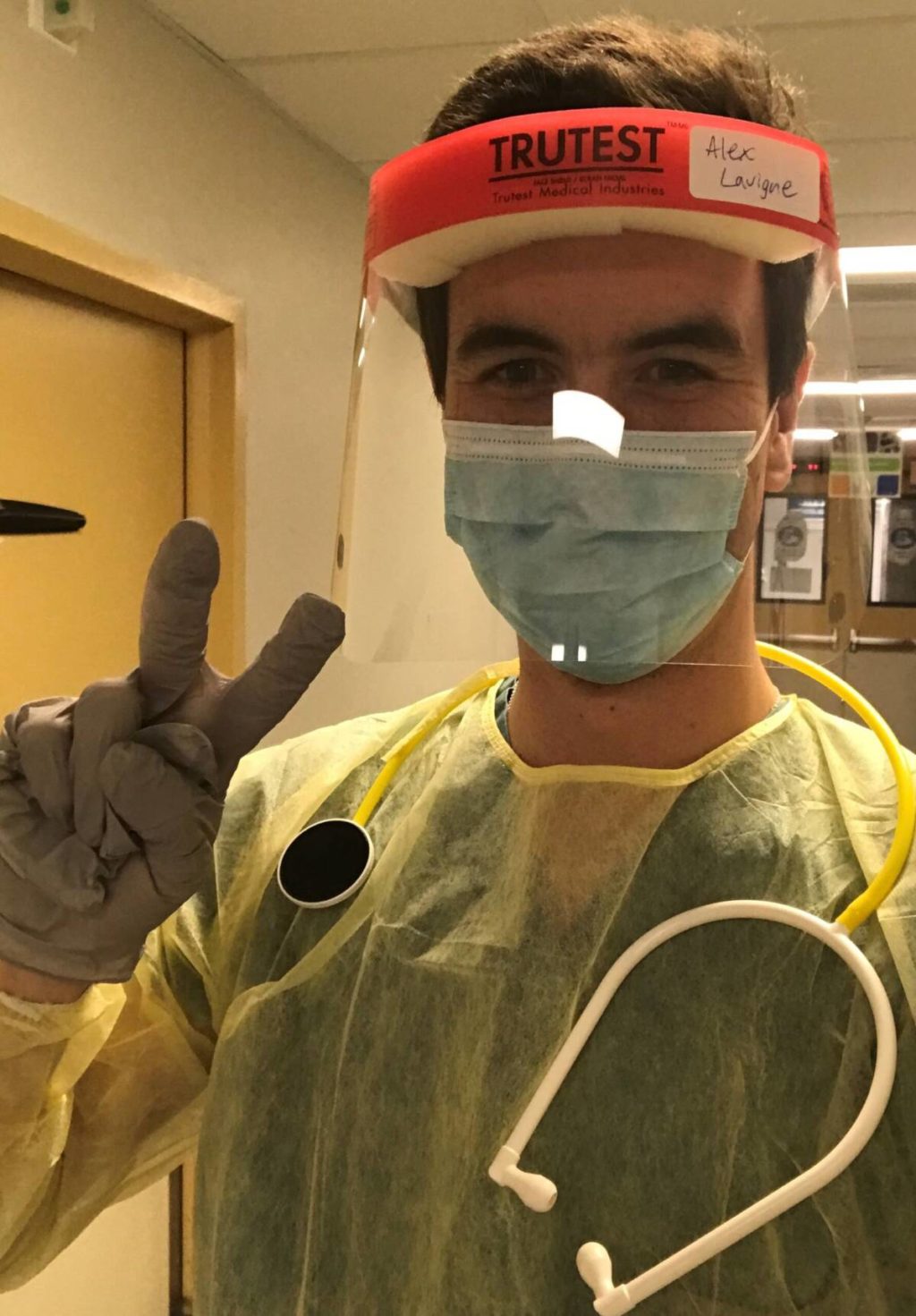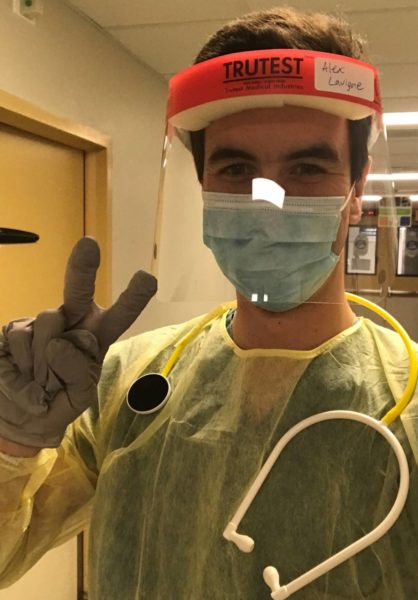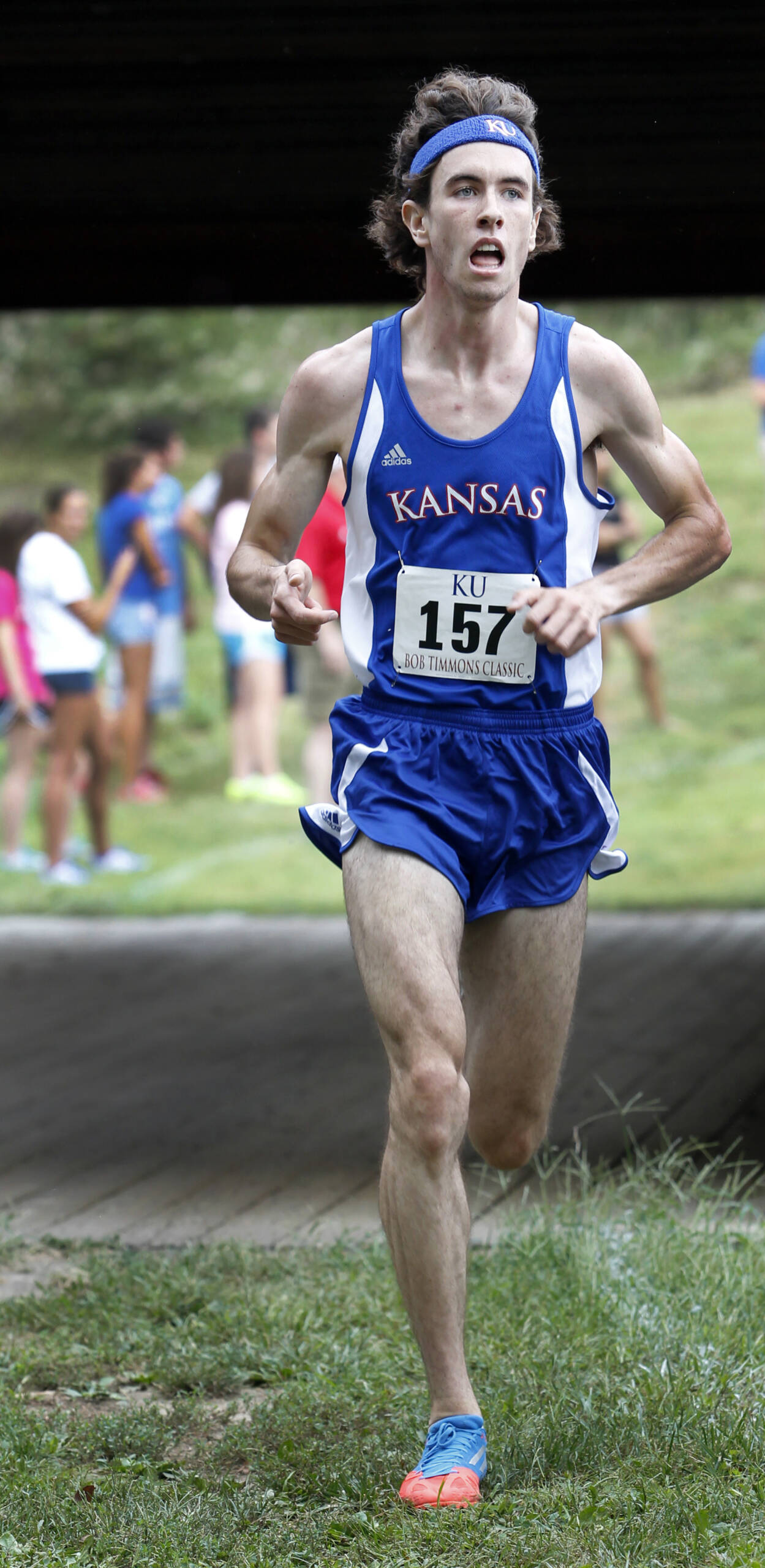
KU Cares: Jayhawks on the Front Lines – Alexandre Lavigne – Kansas Jayhawks
KU Cares: Jayhawks on the Front Lines – Alexandre Lavigne Kansas Jayhawks
Alexandre “Alex” Lavigne ran cross country and track & field for the Kansas Jayhawks from 2013-15. During this time, he studied biomechanical engineering with a pre-med concentration. While already interested in the healthcare system, he wasn’t sure if he wanted to become an engineer or a doctor. So he kept his options open while balancing school and running as much as possible. After running some great races during his first year on the team, during the season of 2014-15, he suffered an injury that never truly healed. At the time, he was doing a lot of rehabilitation. The injury kept him away from competing for quite a while and during the year he met a few doctors who were also trying to get him back in shape. Seeing and working with these therapists and doctors inspired him. Unable to compete anymore, Lavigne felt it would be in his best interest return to his home country of Canada to attend medical school. Having completed all the prerequisites at KU since he was doing a pre-med concentration, he returned to Canada in 2015 and was immediately accepted into medical school.

Q: Can you explain to us what you have been doing since your days at the University of Kansas?
“I graduated from medical school in the spring of 2019 and now I am a first-year physician resident. My residency will last a total of five years. All of the physician residents are affiliated with one university, and mine is the University of Montreal. I am specializing in physical medicine and rehabilitation (PM&R). I feel like it is a good fit for me because it allows me to work mostly in sports medicine and also work in rehab centers for patients with disabilities, like amputations, traumatic brain injuries, and spinal cord injuries. I was very interested in biomechanical engineering as well, so working with patients who need protheses and trying to help them get back to walking and get back to their daily activities, is very satisfying. I try to get them driven for rehab so that they can fulfil their goals; whether that is just walking outside or trying to compete at the highest level.”
Q: How have you been affected by this pandemic in the past few months?
“During the first year of residency, we do a lot of rotations in other medical specialties to build a strong background in fields that are related to our own. Therefore, I spend quite a bit of time in internal medicine, which is the specialty that takes care of the COVID units in the hospital. Montreal is the city which has the highest number of (COVID-19) cases in Canada, so some of our hospitals are filled with patients who are infected by the coronavirus. We isolate the infected patients away from the other ones (patients) so that we don’t get everybody infected. Moreover, during the pandemic, people are scared about coming to the hospital because they don’t want to get infected. Even when they are sick, they wait for a long time at home. However, when they finally show up in our Emergency Rooms (ERs), they are extremely ill, so it is harder to keep them alive. Sometimes it is too late when they arrive, and it is heartbreaking to see these patients pass away because of this pandemic.
“It also impacted me in another way. I am still very close to my friends from KU. We’ve built a strong relationship over the years, since we were teammates, roommates, traveling mates. We were basically together 24/7, dedicated to becoming the best runners we could be. We still visit each other every now and then. I was actually visiting them in Lawrence in early March, just before the COVID crisis exploded. ‘Social distancing’ hadn’t started yet, so we were running on trails where we used to go back in the days and we had a great time together. New directives were enforced by the Canadian government while I was in Kansas visiting, forcing travelers to do a strict quarantine upon returning to Canada. When I came back home, I had to stay in my apartment for two weeks total and then I started working again at the hospital. These rules were really strict, but I am glad that the Canadian government is taking those strict directives so that we take the least (amount of) risks as possible.”
Q: What does a typical workday look like for you right now?
“I don’t have a very typical day – that’s a hard question because it always depends on the rotation I’m doing. Next month I will be a part of a team who works all night shifts during weekdays, from 8 p.m., to 8 a.m. During the night, most physicians are away from the hospital because obviously they need to get some rest, but there are always some residents who are on call, working the floors so that we take care of the patients who are not doing so well (for example having trouble breathing or having pain that is not very well managed). Most of the time we can take care of cases (on our own) but there are times when it gets too hard for us as physician residents. We need to stay humble, accept that we don’t know everything and call the physicians who are sleeping, just to make sure we are doing the right thing. When I’ll be doing these night shifts next month, we’ll be working as a team. Some residents will take care of the COVID units and the other residents are going to cover the other floors of the hospital so that we don’t go back and forth from the COVID unit to other floors and bring the virus everywhere else in the hospital. One thing that is in my daily routine for sure is to be very focused on all the little details and pay attention to personal protection equipment (PPE).”
Q: Is your hospital experiencing any shortages of PPE?
“For now, it seems like we are not having any shortages, but it’s always in the back of our minds, so we have to be very careful with our resources, saving as many as we can. Every time we go see a patient, we need to wear a mask, gloves and a visor. These important tools are not unlimited. We even use plastic stethoscopes so that we don’t bring our own in the COVID unit. All this material is thrown away afterwards, so we need to make sure that we use them for good reasons.”

Q: How does going through that physically, emotionally affect the front line workers?
“It’s heartbreaking to see the patients die alone in their hospital room, without their loved ones at their bedside, since visitors are not allowed at the hospital. Sometimes I explain the situations to families on the phone and they become very emotional. I’m trying to have as much empathy as I can, but these are situations we usually handle in person rather than over the phone. When I hear them cry, I tell them I would give them a big hug if I could. I like the close relationship I have with patients and their families, it’s one of the reasons why I chose to become a doctor instead of an engineer.
“I try to focus on what I can control and then I let go of what I cannot control. It can be hard, mentally, when you think of everything that is going on. But if you stop worrying about the things that you can’t control, it makes it better. That’s interesting because it is a concept that Coach Whitt (Michael Whittlesey) talked about a lot when I was running track at KU. He was always telling us in practice to focus on everything we could control and quit worrying about what we can’t control. Also, he would tell us, ‘Don’t be a superhero. Just be the best version of yourself and that’s going to pay off in the long run.’ And that is exactly what I’m trying to do in the hospital. I’m not trying to be a superhero, just trying to be the best version of myself.”
Q. What is the general feeling/morale among you and your coworkers right now?
“We always work as a team with the whole staff; we have physicians, co-residents, nurses, physical therapists, dieticians and many more professionals who are all doing an amazing job. We support each other and listen to each other when anyone has concerns.
“Coach (Whitt) would give me some good advice over the years, like working as a team, and I still use his advice on a daily basis. I’m so grateful for the years I had at KU. The team effort was very important, supporting each other, being there for each other. That’s what I’m trying to do at the hospital as well.”
Q: Does this remind you at all of Coach Whitt’s “Pack Mentality” on the cross country course?
“For sure! This reminds me of such good memories from when I was running with the pack, my fellow Jayhawks, on my side.
“Speaking of the team, I was so heartbroken when I heard that all of the NCAA races were cancelled this spring because I know how much these races mean to track & field athletes. I know my fellow Jayhawks have been putting so much effort into their training. Being a good runner at the NCAA level is a 24/7 commitment. You always hope that all the effort will pay off in the long run. I was sad for them, but as a physician resident, I totally understand why all of the NCAA events got cancelled this year. It was definitely the best thing to do.”

Q: What positives are you experiencing from your situation and working on the front lines against COVID-19?
“A lot of people must stay at home and that’s the case for me as well when I’m not working at the hospital. I follow the same directives as everyone else. I spend all my weekends in my apartment and I want to be as efficient as I can at finding purposeful things to do (in that time at home). I was already working a little bit on some research projects before the pandemic, but this (directive) has given me more time to do so. The study we are doing is about the healing of Achilles tendon injuries, it is going really well so far. My research team and I are excited to see what the conclusion will be. Self-isolation is an opportunity to find activities that will help us grow as a person as well as professionally.”
Q: What advice would you give to people about fighting this pandemic?
“I’m not here to tell people what to do; what’s good or what’s wrong. There are people way smarter than me who lead the public health department and do press conferences every day, so I think these are the people to listen to. But I really cannot reinforce enough that people should stay home. That’s the key. The more we stay home, the earlier this crisis is going to be over and we will go back to their daily routines.
“I have another (piece of) advice, actually. I’ve noticed that a lot more people are running these days because they want to stay active and all the other athletic facilities are closed (during the pandemic). I find it awesome. Running is a very simple sport, it’s convenient. But the problem is that people go to parks and crowded places, which makes it a risky situation to share viruses. I would recommend to go run early in the morning, when the roads are not very crowded.
“I usually go out for a run at 5 a.m., before going to the hospital and when running outside that early, I don’t see anybody else. I’m just running by myself in the street, so it’s not very risky. I still run on a daily basis, to stay in shape and stay healthy, and because I’m passionate about the sport. I don’t compete as much as I used to since I don’t have as much free time, but I’ll never retire from running. I love the sport too much.”

![]()
